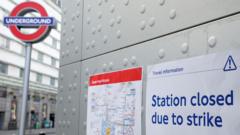What Should You Know About the London Tube Strike?

Published: 2025-09-05 08:00:22 | Category: technology
London Underground services will face significant disruption from Sunday to Thursday as members of the Rail, Maritime and Transport union (RMT) embark on a rolling strike in response to pay and working conditions. The RMT has raised concerns about fatigue management and is calling for a reduction in the working week to 32 hours, aiming to improve the health and wellbeing of its members. This article provides essential details on the strike, its implications, and the wider context of industrial action in London.
Last updated: 08 September 2023 (BST)
Key Takeaways
- RMT strike affecting London Underground from Sunday to Thursday.
- Limited Tube services expected, with full disruption on some lines.
- Call for a 32-hour working week over concerns of fatigue management.
- TfL's proposed pay rise of 3.4% deemed insufficient by RMT.
- Potential economic impact of £230 million due to the strike.
Overview of the Strike
The upcoming industrial action, led by the RMT, is set to commence this Sunday, with significant disruptions expected across the London Underground network. The union's five-day walkout will introduce varying levels of service interruptions, particularly on Monday through Thursday, when different groups of RMT members will strike on alternating days. Commuters are advised to complete their journeys by 18:00 BST on Sunday to avoid complications.
Reasons Behind the Industrial Action
The RMT's call for industrial action stems from serious concerns regarding pay and working conditions. The union argues that current shift patterns contribute to fatigue, significantly impacting the health of its members. RMT general secretary Eddie Dempsey has highlighted the strenuous nature of these shifts, stating that while members are committed to ensuring London remains mobile, the demands placed on them are unsustainable.
Fatigue Management and Working Hours
Fatigue management has emerged as a critical issue in the negotiations. The RMT is advocating for a reduction in the working week to 32 hours, believing this change would alleviate health concerns associated with extreme shift rotations. Dempsey emphasised that these issues have been neglected for years by London Underground management, fostering an atmosphere of distrust among staff.
Transport for London's Response
In response to the RMT's demands, Transport for London (TfL) has stated that a 32-hour working week is not feasible, citing the financial implications that such a change would entail. TfL has proposed a 3.4% pay rise, which the RMT has deemed inadequate. A spokesperson for TfL reiterated the organisation's commitment to treating staff fairly and indicated that they are open to further discussions regarding fatigue management and rostering.
The Economic Impact
The potential impact of the strikes extends beyond inconvenienced commuters. According to the Centre for Economics and Business Research, the strikes could incur direct economic costs of approximately £230 million, reflecting the loss of around 700,000 working days. These figures do not account for the broader indirect effects, which could be even more damaging to London's economy.
Local and Wider Implications
The strikes are likely to affect not only daily commuters but also the wider business community, particularly those reliant on the night-time economy. As many businesses in central London struggle to recover from the pandemic, the disruption caused by the Tube strikes could hinder their progress and further damage the capital's reputation on a global scale.
The Broader Context of Industrial Action
Recent years have seen a rise in industrial action across various sectors in the UK, with workers increasingly vocal about pay and conditions. The situation faced by RMT members is emblematic of broader trends in the workforce, where many employees are demanding better treatment and more reasonable working hours.
Future Prospects and Negotiations
As the strike date approaches, the focus will shift to how TfL and the RMT navigate negotiations. While the current strike is set to cause disruption, the potential for further industrial action looms if the RMT feels its concerns are not addressed adequately. The outcome may depend on the willingness of TfL to reconsider its stance on working hours, as well as the RMT's determination to push for change.
Related Events and Changes
In light of the impending strike, significant events in London, such as concerts and other large gatherings, have already been affected. Coldplay has rescheduled its concerts due to the anticipated disruption, illustrating how the strikes could ripple through various sectors of London life.
Conclusion: What Lies Ahead?
As London braces for the impact of the Tube strikes, the situation raises crucial questions about the future of work conditions and employee rights in the capital. Will TfL choose to engage more constructively with the RMT to avert future strikes? Or will the call for a 32-hour week become a flashpoint for ongoing industrial action? The outcome will significantly affect not only those working within the Tube network but also the wider London community.
FAQs
What days will the London Underground strike occur?
The RMT strike will take place from Sunday to Thursday, with varying levels of service disruption across different days.
Why is the RMT going on strike?
The RMT is striking due to concerns over pay and working conditions, specifically calling for a reduction to a 32-hour working week to address fatigue and health issues among members.
What is TfL's position on the strike?
Transport for London has offered a 3.4% pay rise but stated that a 32-hour working week is neither practical nor affordable, which has led to the current industrial action.
How will the strike affect commuters?
Commuters can expect significant disruptions to Tube services during the strike, with limited services on some days and no service on others. Alternative transport options may become much busier.
What is the estimated economic impact of the strike?
The Centre for Economics and Business Research estimates that the strikes could incur direct costs of around £230 million, reflecting lost working days and broader economic repercussions.
As the situation unfolds, it remains to be seen how both TfL and the RMT will navigate these challenges. The need for effective dialogue and compromise has never been more pressing. #LondonUnderground #RMTStrike #TransportDisruption



